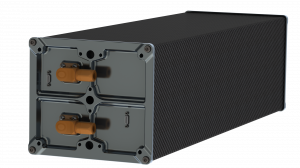Engineered Fluids partners with Dovetail Electric Aviation to develop immersion-cooled batteries for electric aircraft
The partnership will enable next-gen electric aircraft by integrating safe, high-performance immersion cooling into advanced battery systems
The immersion-cooled battery is an integral part of Dovetail’s electric propulsion systems, designed to convert conventional regional aircraft into zero-emission platforms. The collaboration aims to validate immersion cooling technology as a breakthrough thermal management solution for electric aircraft. In aviation—where safety, thermal stability, and performance are mission-critical—immersion cooling provides an optimal approach to energy storage management.
“Electric aviation cannot scale without lighter, safer, high capacity battery solutions, and that requires exacting thermal management at the battery level,” said Gary Testa, President and CEO of Engineered Fluids. “By fully immersing the lithium battery cells in AmpCool™, we deliver dramatically better heat dissipation, eliminate thermal runaway propagation, and extend battery performance in the most regulated environment imaginable - flight.”
Unlike traditional air or cold plate-cooled systems, AmpCool™ offers direct-contact cooling by surrounding each battery cell with a high thermal density, non-conductive, non-flammable, and chemically stable fluid. This provides 1,600x better thermal conductivity than air and serves as a built-in fire suppressant by isolating and containing failed cells without pressure relief systems or heavy, complex cooling systems.
Additionally, single-phase liquid immersion cooling enables simpler thermal management architectures, eliminating heavy heat sinks, fans, pumps, and tubing—resulting in a more reliable and lighter overall battery system. For aircraft, where aircraft weight is directly tied to range and payload, this reduction is a critical enabler for longer flights with heavier payloads.
Dovetail is currently finalizing testing this architecture in both Spain and Australia with very positive results.. The tests form part of the integration roadmap for DovePack™, which is designed to power certifiable retrofit aircraft under Dovetail’s zero emissions electric propulsion architecture. These tests have successfully demonstrated the DovePack’s™’ ability to prevent propagation of thermal events and maintain thermal stability under high stress conditions utilizing AmpCool™ AC-110 dielectric coolant.
“Integrating immersion cooling with AmpCool™ into our DovePack™ system (Dovetail Electric Avaition’s proprietary battery technology) allows us to build safer, lighter, and more compact batteries—something essential for zero-emission flight,” said David Doral, CEO of Dovetail Electric Aviation. “Our mission is to make regional air travel fully electric, clean, and quiet—without compromising on safety. This collaboration marks a major step forward in enabling robust battery systems that meet aviation’s toughest demands.”
This collaboration marks a milestone in the future of sustainable aviation. With global attention on reducing carbon emissions in air travel, Engineered Fluids and Dovetail are tackling the key barrier to progress: enabling battery systems that meet the highest thermal and operational standards in flight
About Engineered Fluids
Engineered Fluids is the world leader in single-phase dielectric cooling solutions. Our fluids, including AmpCool™, are designed for mission-critical applications in data centers, automotive, battery systems, and aerospace. We enable innovation by delivering unmatched thermal management, safety, and performance.
About Dovetail Electric Aviation
Dovetail Electric Aviation is transforming the future of regional air mobility by developing proprietary battery and electric propulsion systems to power the conversion of conventional aircraft into zero emissions. With operations in Australia and Spain, Dovetail’s mission is to make clean aviation commercially viable, scalable, and available to operators worldwide. Learn more at www.dovetail.aero and at https://dovetail.aero/dovepack/ .
Lars Heeg
Engineered Fluids
email us here
Visit us on social media:
LinkedIn
Facebook
YouTube
TikTok
Legal Disclaimer:
EIN Presswire provides this news content "as is" without warranty of any kind. We do not accept any responsibility or liability for the accuracy, content, images, videos, licenses, completeness, legality, or reliability of the information contained in this article. If you have any complaints or copyright issues related to this article, kindly contact the author above.
Warehouse Robotics Market to Reach $31,343.7 Million by 2032 at 18.2% CAGR: Allied Market Research
Nano Gold in India Market Growth Analysis Report with Future Business Scope and New Investment Plans by 2027
Packaging and Protective Packaging Market to Reach USD 1.5 Billion by 2031, Expanding at a Steady CAGR of 4.3%
Kalendarium
Więcej ważnych informacji
 Jedynka Newserii
Jedynka Newserii

 Jedynka Newserii
Jedynka Newserii

Prawo

KE proponuje nowy Fundusz Konkurencyjności. Ma pobudzić inwestycje w strategiczne dla Europy technologie
W środę 16 lipca Komisja Europejska przedstawiła projekt budżetu na lata 2028–2034. Jedna z propozycji zakłada utworzenie Europejskiego Funduszu Konkurencyjności o wartości ponad 400 mld euro, który ma pobudzić inwestycje w technologie strategiczne dla jednolitego rynku. Wśród wspieranych obszarów znalazła się obronność i przestrzeń kosmiczna. Na ten cel ma trafić ponad 130 mld euro, pięciokrotnie więcej niż do tej pory.
Firma
Były prezes PGE: OZE potrzebuje wsparcia magazynów energii. To temat traktowany po macoszemu

Choć udział odnawialnych źródeł energii w miksie energetycznym Polski jest stosunkowo wysoki i rośnie, to ten przyrost jest chaotyczny i nierównomiernie rozłożony miedzy technologiami – wskazuje Forum Energii. Dodatkowo OZE potrzebują wsparcia magazynów energii, a zdaniem Wojciecha Dąbrowskiego, prezesa Fundacji SET, ten temat jest traktowany po macoszemu. Brak magazynów powoduje, że produkcja energii z OZE jest tymczasowo wyłączana, co oznacza marnowanie potencjału tych źródeł.
Infrastruktura
Wzrost wynagrodzeń ekip budowlanych najmocniej wpływa na koszty budowy domu. Zainteresowanie inwestorów mimo to nieznacznie wzrasta

Budowa metra kwadratowego domu w Polsce kosztuje od 5,55 do 6 tys. zł w zależności od województwa – wynika z najnowszych analiz firmy Sekocenbud. Najdrożej jest w Warszawie, gdzie cena za metr kwadratowy domu przekroczyła już 6,2 tys. zł. Na przyrosty kosztów budowy domu wpływają zarówno drożejące materiały budowlane, jak i wyższe wynagrodzenia pracowników. Inwestorzy nie rezygnują jednak z budowy domów jednorodzinnych, co ma związek m.in. z wciąż wysokimi cenami mieszkań czy też obniżką stóp procentowych.
Partner serwisu
Szkolenia

Akademia Newserii
Akademia Newserii to projekt, w ramach którego najlepsi polscy dziennikarze biznesowi, giełdowi oraz lifestylowi, a także szkoleniowcy z wieloletnim doświadczeniem dzielą się swoją wiedzą nt. pracy z mediami.









.gif)

 |
| |
| |
|